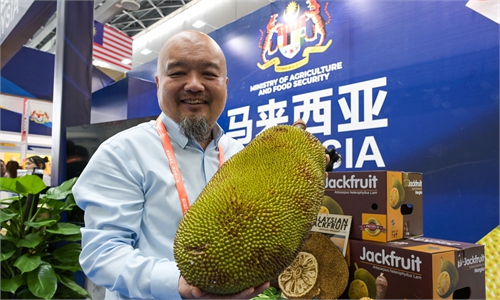
Sales staff shows durian imported from Thailand. Photo: VCG
From coffee, durian and jackfruit to rice, the 20th China-ASEAN Expo, which opened on Saturday in Nanning, capital of South China's Guangxi Zhuang Autonomous Region, is no doubt a dazzling array of tropical fruits and every kind of agricultural product you can think of.
Love them or hate them, durians are becoming a focus among all rivals, though the appetite for durians has been growing voraciously in China for years.
"We arranged a cargo ship carrying 20 tons of Malaysian Musang King durians for the expo. The ship, starting from Kuantan Port, Malaysia, docked at the Beibu Gulf Port Qinzhou Port Area and then arrived at the cold storage area of the Beigang Logistics Nanning International Comprehensive Logistics Park on September 9," Xie Jialiang, general manager of Guangxi Beibu Gulf Logistics Co Nanning Branch, told the Global Times on Sunday.
The route is the first trial for Xie's company.
Xie said his company has observed an increasing demand for frozen food in China after the epidemic, especially fresh durian, frozen durian, and some pre-made dishes, noting that the company is preparing to operate this transport route on a regular basis, and then sell ASEAN products to provinces and cities in western China through its geographical advantage.
Aside from the widely recognized Musang King from Malaysia, Philippine durians also made their debut at the expo.
In January, China said it will allow imports of durians from the Philippines if the durians meet certain requirements. The new rule provided Philippine durians with the same market access as those from Thailand, Malaysia and Vietnam.
Also a newcomer at the expo is the Malaysian jackfruit. Malaysia has recently become the third country, after Thailand and Vietnam, to gain access to the Chinese market for fresh jackfruit, with the deal being finalized in April of this year.
"The amount of the first batch of jackfruit is limited, and it will be first supplied in the high-end market in China," Zhi Hui, an exhibitor at the booth displaying jackfruits from Malaysia told the Global Times on Sunday.
The China-ASEAN Expo, also known as CAEXPO, is an annual trade show that aims to facilitate economic cooperation between China and ASEAN. This year's expo runs from Saturday to Tuesday in Nanning, with the exhibition's scale bouncing back to pre-pandemic levels.
In the 20 years since the expo was first held, 74 types of fruits from nine ASEAN member countries, including Vietnam, Thailand, the Philippines and Cambodia have been admitted to China, according to a report from Guangxi Daily.
As the main channel for imported fruits between China and ASEAN, Guangxi imported 615,000 tons of ASEAN fruits from January to August this year, a year-on-year increase of 61.7 percent. The import value reached 18.6 billion yuan ($2.56 billion), up by 218.7 percent, the report said.
China is willing to work with ASEAN members to seize opportunities such as the full entry into force of the Regional Comprehensive Economic Partnership (RCEP) agreement, and to further deepen mutually beneficial cooperation in agriculture, China's Minister of Agriculture and Rural Affairs Tang Renjian said at a forum held on the sidelines of the expo on Sunday.
Tang said the two sides should consolidate ties in the agricultural economy and trade, which serve as a "ballast stone" for mutual trade, while jointly promoting the region's agricultural development toward a safer, greener, smarter and more stable situation.
"We have about 76 companies from Thailand [for the expo], ranging from food and beverages to fashion, among others. We believe China is always the largest market for Thai exports. I hope that this trend will continue, and we can develop more and closer relationships between Thailand and China," Kwanapa Phivnil, a trade expert at the Department of Foreign Trade, Ministry of Commerce, told the Global Times on Saturday.
This year, the promotion focus for Thai companies is also about agriculture - mainly about high-quality Thai rice, Phivnil said.
"Actually, bilateral trade is always good, and I believe that there is more room," said the Thai trade officer.


